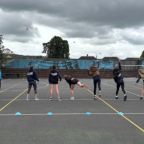
Plymouth explorer-in-residence set for nutrition, dementia and music research at South Pole
Polar explorer Antony Jinman will be promoting good nutrition to children, assisting dementia researchers and composing music as part of his latest epic adventure.
Plymouth University’s Explorer in Residence will be following in the footsteps of another great figure, Captain Robert Falcon Scott, when he sets out later this month on a 730-mile solo expedition to the Geographic South Pole.
And besides the physical and mental challenges of surviving the planet’s most hostile conditions, Antony will take part in a series of groundbreaking projects based in his home city.
He will receive an official civic send-off from senior city officials at the University on Wednesday 13 November, then begin the long journey to the Antarctic before spending around 60 days on the ice, only able to contact the outside world through an iPad.
Antony, who runs the Plymouth-based organisation Education through Expeditions (ETE), said: “I am delighted to once again be working with Plymouth University to educate young people about the Polar regions and inspire them to follow their own dreams in life. Through our partnership, I have been able to work with students and academic staff across the institution to develop some excellent resources for schools to use as they follow my expedition. Through this expedition I will continue to deliver the University’s Explore, Dream, Discover motto and aim to inspire and encourage others to do the same.”
While on the expedition, Antony will use high-tech aerial drones to capture images of himself on the ice, with children in 200 schools across the South West have signed up to access his blog and follow his progress.
They will also have full access to the expedition’s team of scientists, nutritionists and health and fitness professionals and will be able to interact with Antony and find out about the major physical challenges he is facing.
During the expedition, Antony will also communicate with the University’s dementia researchers, who will pose a series of questions designed to show how memory is affected by both extreme physical conditions and by loneliness.
He will also work with composer Dr Alexis Kirke, from the University’s Interdisciplinary Centre for Computer Music Research, to create several pieces of music inspired by his moods during the course of the expedition.
Antony says this approach to exploration is driven by his own personal experiences of how learning can be enhanced when it inspires the heart as well as the mind.
He said: “The golden age of exploring for exploring’s sake may be over, but the value of expeditions today must be to link future generations to places that open their eyes, minds and hearts to learning. By contributing to scientific research, and even artistic performances, it can inspire people of all ages to realise that expeditions of this nature do have a fascinating part to play in the future of society.”











